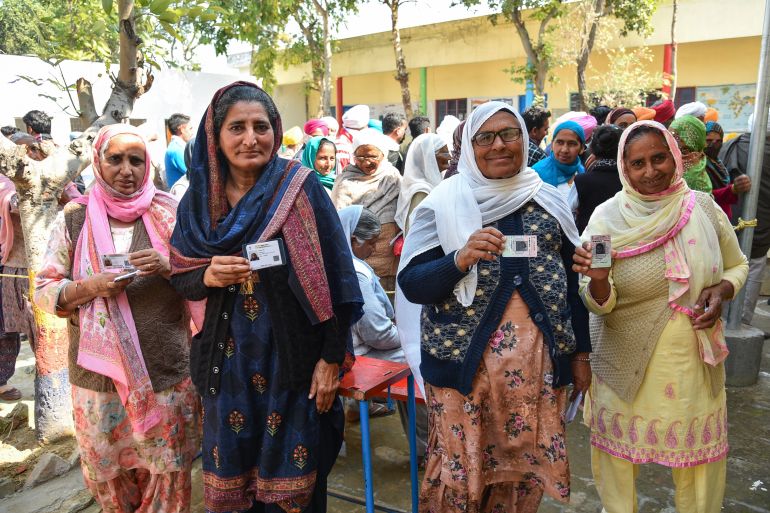Indian gov’t presents bill to reserve a third of parliament seats for women
Analysts say the chances of the bill getting passed in parliament have brightened as opposition to it has shrunk over the years.

Indian Prime Minister Narendra Modi’s government has moved a bill to reserve one-third of seats in the lower house of parliament and state legislative assemblies for women.
The contentious legislative proposal has been hanging for decades due to opposition from some heartland political parties and needs the approval of both houses of parliament and a majority of state legislatures to become law.
Keep reading
list of 4 itemsIndia women
Fight for gender equality as India votes
How far have Indian women come?
Its revival on Tuesday comes months before general elections are due by May 2024, when Modi is seeking a third term. Analysts say the chances of the bill getting passed in parliament have brightened as opposition to it has shrunk over the years.
“This is a historic moment, this is a moment of pride for us. For many years there have been a lot of discussions about the Women’s Reservation Bill after it was first introduced in 1996,” Modi said in parliament on Tuesday before Law Minister Arjun Ram Meghwal presented the bill to legislators.
“There were not enough numbers to pass the bill and the dream remained unfulfilled. It seems for these sacred works, God has chosen me,” he said, adding that more and more women should join the development process of the country.
When asked about the bill, opposition leader Sonia Gandhi of the Indian National Congress party called it “ours” – referring to her party’s long-standing demand for its passage.
Women account for almost half of India’s 950 million registered voters but only 15 percent of parliament and about 10 percent of state legislatures, pushing the world’s largest democracy towards the bottom of the global list on gender parity in legislatures.
Meghwal said the 542-seat lower house has 82 women members at present and if the bill is approved the number will rise to at least 181.
Subhashini Ali, a former Communist Party of India parliamentarian, told Al Jazeera the tabling of the bill was “a very, very long wait”.
“We have been consistently fighting for it and I am very happy,” she said. “Democracy is all about widening and expanding representation.”
Congress spokeswoman Shama Mohamed told Al Jazeera the ruling Bharatiya Janata Party could have brought the bill earlier since the ruling party had it in its election manifestos in 2014 and 2019.
“I must say it be a victory for the Congress Party if the bill is finally passed,” she said, claiming her party gave the nation its first female prime minister, the first woman speaker of parliament and the woman president.
“Women’s reservation in grassroots politics was brought in by Rajiv Gandhi when he was the prime minister … In 2010, it was passed in Rajya Sabha [the upper house of parliament] and since we didn’t have the numbers in the Lok Sabha [the lower house], we could not pass it,” she said.
Successive governments have sought to address this imbalance since the mid-1990s by trying to make a law that reserves a third of seats for women at the national and state levels. The bill was first introduced in parliament in 1996.
But it has been repeatedly blocked by Hindi heartland parties, with some of their legislators aggressively disrupting proceedings and snatching and tearing copies of the bill before being physically escorted out of the chambers.
Opponents of the move say reserving seats for women will only benefit educated and urban women and deprive their disadvantaged rural counterparts from so-called backward castes.
They want a quota for women from these castes within the overall quota for women to ensure what they say will be a true gender balance.
Activists and analysts, however, say leaders of these parties are patriarchal and oppose the proposal as they fear losing power to women if a third of the seats are blocked.
The strength of these parties has, however, shrunk over the years and the latest proposal is not likely to face as much opposition, analysts say.
Tarushikha Sarvesh, who teaches women’s studies at the Aligarh Muslim University, told Al Jazeera the bill’s introduction is a positive move.
“But there is a need to watch how it is worded in order to include the different views and concerns of women,” she said. “This time the atmosphere appears to be more favourable for the bill’s passing, yet one must be mindful of the realities of gender, caste and community.”